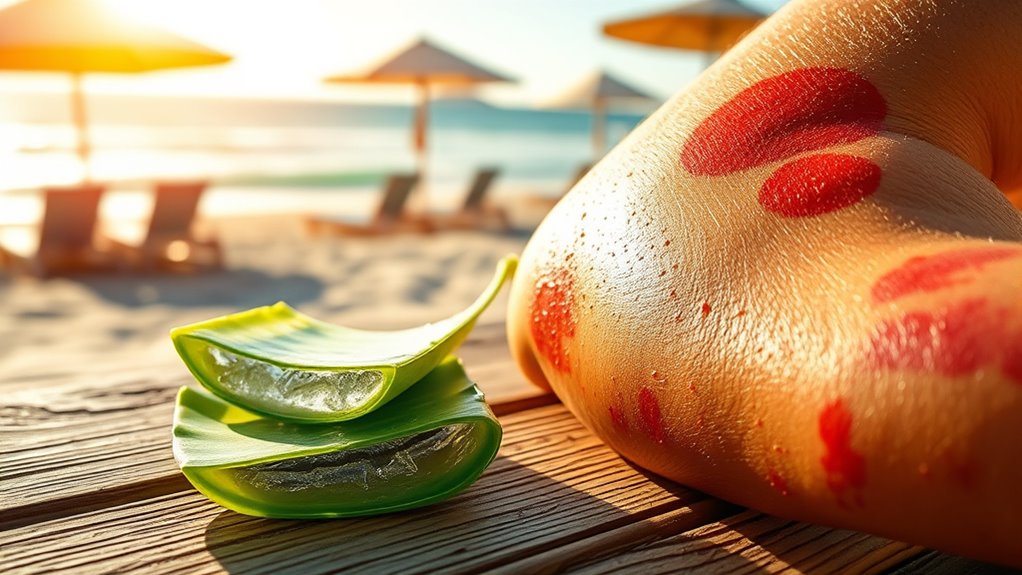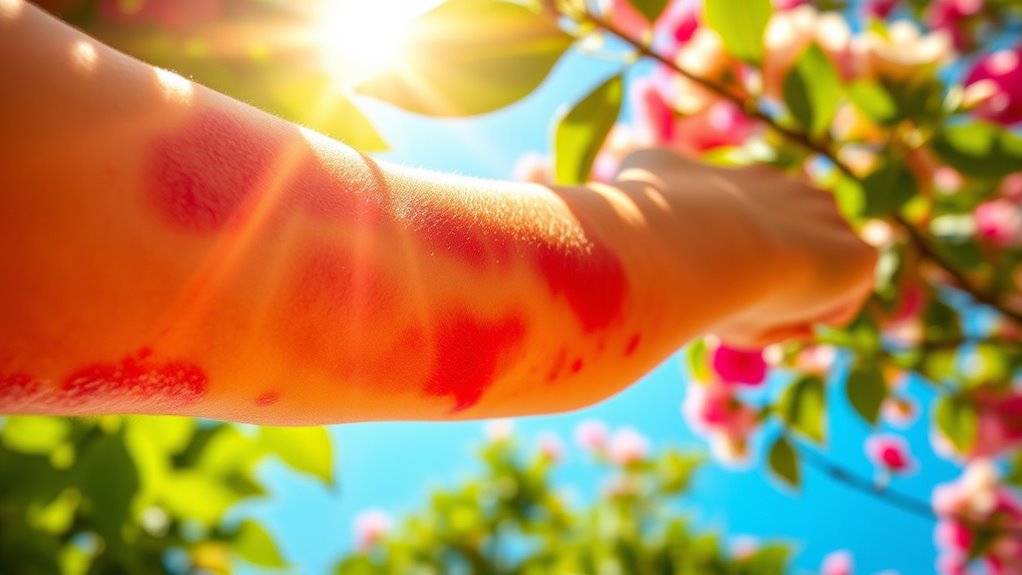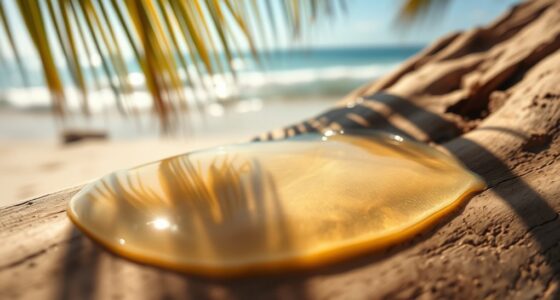When you get sunburned, avoid peeling or scrubbing the skin, as that can worsen irritation. Don’t apply petroleum jelly or butter, which trap heat and delay healing. Skip home remedies like yogurt or honey, as evidence is limited and they may introduce bacteria. Refrain from exposing your skin to more sun, and don’t rely solely on high SPF sunscreen without reapplying. Stay informed on safe practices to ease your recovery and protect your skin.
Key Takeaways
- Avoid using butter, oil, or toothpaste on sunburned skin, as they can worsen irritation or cause infections.
- Do not peel or scratch blisters; this increases risk of infection and delays healing.
- Refrain from applying harsh chemicals or unverified home remedies like yogurt or honey without caution.
- Never expose sunburned skin to more sunlight; seek shade and avoid additional sun exposure.
- Don’t ignore hydration needs; avoid alcohol or caffeine, which can dehydrate the body further.

Have you ever wondered which remedies truly ease sunburn pain and which are just myths? When you’re sunburned, it’s tempting to try every home remedy or popular advice you hear, but not all of them are effective or safe. Some natural remedies may provide relief, while others are based on SPF myths that can actually do more harm than good. Understanding what works and what doesn’t is key to healing quickly and avoiding further skin damage.
First, let’s talk about natural remedies. Applying cool compresses or taking a cool bath can help soothe the burning sensation. Aloe vera gel is often hailed as a miracle cure, and for good reason. It contains anti-inflammatory properties that can reduce redness and discomfort. Just make sure you’re using pure aloe, not products with added fragrances or alcohol, which can irritate your skin further. Hydration is also essential. Drinking plenty of water helps your body recover and prevents dehydration, which can worsen the effects of sunburn. You might have heard of applying yogurt or honey to sunburned skin—some swear by these, but evidence supporting their effectiveness is limited. While they won’t cause harm in small amounts, they’re not proven remedies for pain relief or healing. Additionally, some natural remedies can sometimes introduce bacteria or irritants if not used carefully, so caution is advised.
Cool compresses, aloe vera, and hydration can soothe sunburn; yogurt and honey lack proven healing benefits.
On the topic of SPF myths, many people believe that applying SPF once in the morning is enough to prevent sunburn. That’s false. Sunscreen needs to be reapplied every two hours, especially if you’re swimming or sweating. Some think that higher SPF means you can stay in the sun longer without harm. In reality, SPF only measures protection against UVB rays; it doesn’t make you invincible. There’s also a myth that SPF 30 is considerably less effective than SPF 50. While higher SPF provides more protection, the difference isn’t as dramatic as many believe. The key is consistent, correct application and reapplication, not just choosing a high SPF number.
Another SPF myth is that sunscreen alone offers complete protection. It doesn’t. Wearing protective clothing, seeking shade, and avoiding peak sun hours are equally important steps. Some believe that SPF can be applied once and left on all day—never true. Reapplication is essential, especially after swimming or sweating. It’s also important to note that no sunscreen blocks 100% of UV rays, so limiting sun exposure during peak hours can save your skin from further damage.
Frequently Asked Questions
Can I Pop Blisters Caused by Sunburn?
You should avoid popping blisters caused by sunburn, as doing so can increase the risk of infection and slow healing. For blister care, keep the area clean and protected with a sterile bandage, and let it heal naturally. Proper sunburn treatment involves soothing the skin with cool compresses and moisturizing. Popping blisters isn’t recommended because it can complicate recovery and lead to more discomfort.
Is It Safe to Apply Ice Directly on Sunburned Skin?
Think of your sunburned skin as a fragile, fiery canvas that needs gentle care. Applying ice directly on it is like pouring cold water on a hot iron—it can cause more damage. Instead, opt for ice application wrapped in a cloth to gently cool your skin. This skin cooling technique relieves pain without risking frostbite, helping your skin heal without adding to the inflammation.
Should I Use Moisturizer Immediately After Sunburn?
You should use moisturizer immediately after sunburn because it helps lock in skin hydration, which is vital for healing. Moisturizer benefits include soothing the skin, reducing peeling, and preventing further dryness. Applying a gentle, hydrating lotion or aloe vera gel keeps your skin moist and promotes recovery. Avoid heavy creams with fragrances, and opt for products designed for sensitive or sunburned skin to support your healing process.
Are There Any Natural Remedies That Can Prevent Peeling?
Think of your skin as a delicate garden that needs nurturing after sun damage. Natural remedies like aloe vera, coconut oil, and honey act as gentle rain, soothing and hydrating while helping peel prevention. These remedies support your skin’s healing and reduce peeling, much like a gardener tending to fragile plants. Using them regularly can keep your skin healthy, protected, and less prone to peeling, restoring your summer glow naturally.
Can I Go Swimming With a Sunburn?
You should avoid swimming with a sunburn because the chlorine and salt can irritate your already sensitive skin. Instead, focus on sun protection and keeping your skin hydrated. Staying out of the water helps prevent further damage and reduces discomfort. Make sure to apply soothing lotions and drink plenty of water to maintain skin hydration, which aids healing. Prioritize skin care and avoid exposing your sunburned skin to additional sun or harsh chemicals.
Conclusion
Remember, when you get sunburned, don’t fall for silly myths or risky remedies. Instead, stick to proven tips like cooling your skin and staying hydrated. Ignoring proper care can turn your sunburn into a nightmare worse than a thousand suns. So, be smart, act fast, and protect your skin. Your future self will thank you, and trust me, nobody wants to look like a lobster for the rest of their summer!









